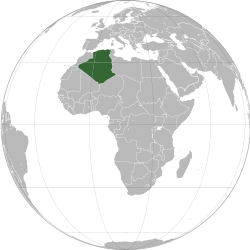Ansar Al-Din, MNLA Sign Deal In Algiers
By Magharebia
By Hayam El Hadi
Two Malian rebel groups on Friday (November 21st) said they were committed to suspending hostilities and holding peace talks, despite condemning the UN’s approval of plans for an African-led intervention to reconquer the country’s Islamist-held north, AFP reported.
Ansar al-Din and the National Movement for the Liberation of Azawad (MNLA) signed a seven-point partnership agreement in Algiers under which both parties rejected terrorism and opposed the use of military force in northern Mali.

The two groups have also engaged in talks with Mali’s interim government after pledging earlier this month to respect the country’s territorial integrity and root out terrorism.
Algeria, with the mediation of Burkina Faso, succeeded in getting Ansar al-Din and the MNLA to reach a deal.
Ansar al-Din’s Mohamed Ag Akharib and the MNLA’s Bey Diknan pledged to “refrain from any action which may lead to situations of conflict and from all forms of hostility in the areas under their control and to make every effort to honour this commitment”.
After the deal was signed, both parties hailed Algeria’s efforts to promote dialogue. While in Algiers, Ag Akharib said that his group “reiterates its desire for and commitment to a peaceful resolution” and praised “Algeria’s efforts to resolve the Malian crisis through dialogue”.
The two groups announced their intention to take steps to free hostages, provide emergency humanitarian assistance to communities and to facilitate the free movement of people and goods. Additionally, they pledged to send in forces to maintain the security of the areas they control.
Ten Europeans and three Algerians remain held hostage in northern Mali, kidnapped by al-Qaeda in the Islamic Maghreb (AQIM) and its offshoot the Movement for Tawhid and Jihad in West Africa (MUJAO) since September 2010.
The two Malian groups jointly condemned Resolution 2085 adopted on Thursday by the UN Security Council, which unanimously approved the deployment of a 3,300-strong international force in northern Mali for one year. The resolution also authorised “all necessary measures” to help the Malian government regain its full territorial integrity.
But the 15-member council insisted that military force could only be used after political efforts were exhausted. It said military plans would have to be refined and approved before any offensive started.
The Security Council also called on the transitional authorities in Bamako to re-establish constitutional order and hold elections before April 2013.
It urged them to engage in “credible” negotiations with groups in the north, including the side-lined Touaregs.
A move toward a military offensive would come in a second phase.
Mali’s government hailed the Security Council decision on the intervention plan as a sign that the world would not abandon the country.
“We are grateful to the international community, a consensus has been reached on the Malian situation,” said advisor to Mali’s interim president Dioncounda Traore.
“We are going to wage war against the terrorists and continue to negotiate with our brothers who are ready for dialogue”, he added.
Another Mali politician, Mustapha Cisse, said the UN vote showed “the willingness of the international community not to abandon Mali to its own devices”.
Ansar al-Din and the MNLA instead called for a “peaceful, lasting and final solution to the conflict in accordance with Islamic principles and in harmony with the true values of the people of Azawad, respecting all basic freedoms without distinction and universal rules concerning human rights”.
Ag Akharib asked “Algeria and the international community to help the people of Mali in their quest for a solution to this crisis, by political rather than military means”.
Algerian diplomats have sought to bring about a peaceful end to the crisis in Mali. Efforts have been made to convince neighbouring countries of the need to preserve Mali’s integrity.
The conflict has so far displaced more than 400,000 people, according to the UN.
